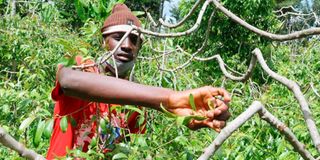Premium
Miraa traders take on CS Kagwe over threat to revoke export licenses

A farmer harvests his miraa crop in Nchoroiboro village, Buuri East Sub county, Meru county on June 4, 2020.
Miraa traders in Meru have expressed concern that the ongoing tussle over pricing driven by business rivalry is likely to shrink their only reliable khat market in Somalia.
Kenya exports about 30 tonnes of miraa to Somalia, valued at over Sh20 million daily, while at least 50 tonnes are sold locally, particularly in the north eastern region.
Despite Agriculture Cabinet Secretary Mutahi Kagwe doubling farm gate prices, exporters have refused to comply, citing costs, with Mr Kagwe giving them an ultimatum to comply, otherwise they will lose their licenses.
The tussle over the business has led to several protests in the recent past, with farmers boycotting the north eastern Kenya and Somalia market in February.
Currently, a kilo of miraa is being bought at about Sh150 against the government-recommended price of up to Sh1,300 for grade 1.
The Kenya Miraa Traders Association said the recent clamour for cancellation of export licenses was unfairly targeting Somali traders who have driven the lucrative trade for years.
Various lobby groups have been blaming the low farm gate prices on the existing licensed exporters, whom they accuse of working with a cartel to hold the farmer hostage.
Kenya's Ambassador to Somalia, Mr Kubai Iringo, recently said the miraa business was currently concentrated in Mogadishu only, hence the low demand.
He blamed the situation on a monopoly of exporters in Kenya who did not want other players in the space.
However, the miraa traders’ association chairman, Mr Gitonga Ndolo, said there was a need for caution in the clamour for better prices, so as to secure the only remaining export market.
“We have noted with concern that some lobby groups have been hitting out at Somali traders who have been doing this business for a long time. We must respect all actors in the value chain because they matter. Since we lost the UK and Holland markets, we must safeguard the reliable one in Mogadishu,” Mr Ndolo said.
A section of traders had expressed concern that the ongoing campaign for improved prices was being used to edge out some players.
Mr Ndolo said the Somali traders have been in the business for the last 50 years, and their role cannot be underestimated.
Mr Mohamed Quresh, a miraa trader, said the demand for khat in Somalia was shrinking due to various factors, including the three-year ban from 2020.
“The business is done based on mutual agreement between the buyer and seller. As traders, we must respect the work of every player from the bottom to the top of the value chain. Traders are free to scout the market and sell. Politics and rivalry will hurt the business,” Mr Quresh said.
The traders are now calling for deliberate efforts to safeguard the Somalia market, as well as heightening the search for new markets.
“Instead of fighting the Somalis who sell our miraa in Mogadishu, we should focus on getting new markets. Let us work as a team in arriving at agreeable prices,” Mr Gerald Gitonga said.
According to Nyambene Miraa Trade Association (Nyamita), the 11-day farmers’ boycott cost more than Sh350 million in lost opportunity.
Nyamita called on the Agriculture and Food Authority (AFA) to take full control of miraa trade and help in the resolution of disputes without hurting the business.


